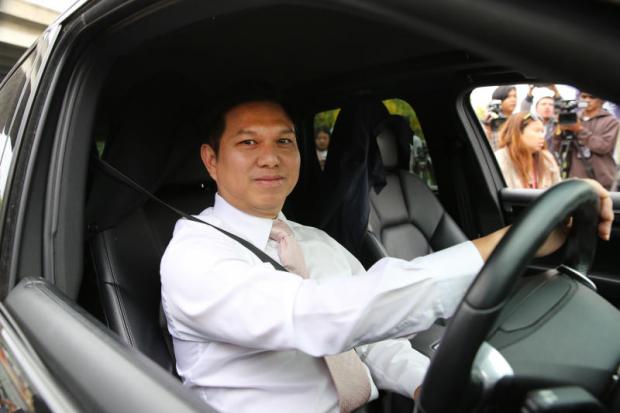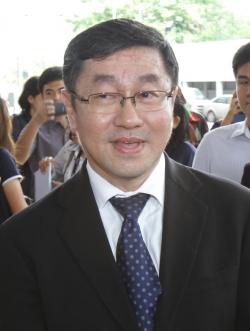
Democrat Party leader Abhisit Vejjajiva has done the unexpected -- written a love letter steeped in a political message in what could be one of his last-ditch efforts to rally support before the upcoming election.
The letter was read out at a recent debate between party leaders to showcase their visions and policies, which was broadcast live online.
While the letter arguably was the star of the show, not every listener -- both in the studio or at home -- was left smitten by it.
Some analysts saw the letter as a clever ruse to put the Democrat leader in the limelight and show that the Democrat Party is trying to set itself apart from the competition, not just as a party that is content to play second fiddle to the pro-regime Palang Pracharath Party (PPRP).
Mr Abhisit has only spoken openly about his party's coalition plans twice. The first, was when he ruled out the possibility of forming an alliance with a party that has "an unsavoury past" -- a reference to the Pheu Thai Party.
The second was when he announced that he will not back Prime Minister Prayut Chan-o-cha's bid to be premier out of fear of allowing the military regime to cling on to power, in a video released only a few days later.
Gen Prayut has been nominated as a prime ministerial candidate by the PPRP.
A number of opinion polls have predicted that the lion's share of the 350 constituency seats up for grabs in the House of Representatives will go to Pheu Thai, while the Democrats are expected to trail behind, followed by the PPRP in third place.
Mr Abhisit had insisted that he spoke on the party's behalf when he spoke about shunning Gen Prayut. However, today the Democrat leader entertained the notion of partnering with the PPRP to establish a coalition government.
That said, he also outlined a condition for cooperation -- that the PPRP must show that it has no intention to further entrench the military regime's hold over the new government.
As soon as the political dust over the video clips settled, the Democrat boss penned the aforementioned "love letter", in which he painted dramatic portrayals of the three "suitors" who are incompatible for "you" -- by which, he meant the voters.
The letter began by describing a candidate who promised voters the world, only to rob them blind and disappear from sight.
It went on to tell about a second candidate -- a strong and protective character that became authoritarian and domineering as time went by.
The letter then described a third "suitor", who charms voters with his promises to be the agent of change, but is plagued by a fair share of flaws, including an abrasive nature and an overwhelming desire to do away with traditional values.
These are believed to be references to the fugitive former premier Thaksin Shinawatra, Prime Minister Prayut Chan-o-cha, and Future Forward Party leader Thanathorn Juangroongruangkit.
Political observers cautioned that there are Democrat supporters that are leaning towards the PPRP -- those who want the military to stand by the government to maintain peace and order -- and their opinions on the Democrat Party may change after they hear what Mr Abhisit has said about Gen Prayut.

Woravat: Wants re-run in Phrae
Ban doesn't turn down heat
The dissolution of the Thai Raksa Chart (TRC) Party has done nothing to take the heat out of politics with the March 24 election just around the corner.
In fact, the demise of the TRC, widely seen as a sister party of the Pheu Thai Party, has threatened to whip up a messy legal business, which can be traced to a possible loophole in the constitution.
The TRC, ordered by the Constitutional Court to be dissolved on March 7 over its nomination of Princess Ubolratana as its prime ministerial candidate, may cease to exist but its members are free to join other parties, although they are not eligible to stand as MP candidates for these parties in this election on account of them falling short of the 90-day membership requirement.
The former TRC members are though permitted to assist their new parties in electioneering.
However, poll analysts have warned the freedom to canvass for votes might come at a cost if former TRC members who switched parties do not tread carefully.
One case in point is Thitima Chaisang, a former MP candidate of the TRC who this week encouraged her supporters to "transfer" their votes to the Future Forward Party (FFP), an ally of the so-called "pro-democracy" camp.
Shortly before that, Woravat Auapinyakul, another former TRC member, said campaigns were being mounted in his native Phrae province to encourage local voters to vote "no" in the election.
According to the constitution, if a vote "no" tally outstrips the votes for the winning candidate in a constituency contest, a fresh vote must be organised with a whole new batch of candidates.
This opens up the opportunity for Pheu Thai, which is not represented in Phrae in the March 24 race, to enter a re-run in the two constituencies in the northern province.
Mr Woravat, who has now rejoined Pheu Thai, declared the election will see a very high number of vote "no" ballots.
However, the Election Commission promptly warned that a party member openly encouraging a large number of voters to "transfer" their votes to a another political party could be violating the election law.
An observer said a vote "no" campaign also carries the legal risk of misleading voters, although Mr Woravat insisted it does not infringe on any law.
A political source said the fate that befell the TRC was the result of the constitution being put to the test, as it was the first party dissolution case of its kind in Thai history.
The source explained the charter itself may be to blame for possibly having failed to go far enough in defining what former members of dissolved parties can or cannot do in the aftermath of a dissolution.
The source suggested that the charter should have spelt out certain restrictions to be imposed on former members of parties dissolved during an election campaign period.
The restrictions could affect their ability to help another party or "transfer" votes, which may be interpreted as undue influence on voters.
Pheu Thai looks to win big

Surapong: Plotting path to poll win
The Pheu Thai Party is only contesting 250 of the 350 constituencies up for grabs but it is widely tipped to win the highest number in the upcoming general election, which is just over a week away.
Seeing the new election rules as unfavourable to larger political parties such as itself, Pheu Thai said it sees no point in competing in the 100 constituencies where it does not believe it has much hope of success.
But to gain control in the 500-member House of Representatives -- made up of 350 seats from the constituencies and another 150 from the party list system -- the former ruling party will need more than 250 seats.
As such, it was counting on its "sister" party, the Thai Raksa Chart (TRC), to win more seats in the list system.
With the majority of seats seeming to be within its grasp, Pheu Thai hoped it would have the power and the legitimacy to beat the 250-member Senate, which is being appointed by the regime, for the vote in parliament to pick the next prime minister, before it moved to form a coalition government.
But now that the TRC has been dissolved and is out of the race, Pheu Thai's "numerical" target seems to be slipping away from it.
The party needs a new strategy, and needs it fast, to turn the tables on the regime and keep it from holding onto power, according to political observers.
Pheu Thai key figure Surapong Suebwonglee has apparently found a way to win the poll -- the prospect of which appeared lost when the TRC was dissolved early this month -- and he has described it as a strategic vote.
According to Mr Surapong, a candidate does not need to win big. With several candidates competing for votes, the winner will need little more than 50% of support.
It is estimated that a House seat will be allocated for every 80,000 votes a political party receives.
This number is based on the total number of valid ballots, expected to be around 40 million, divided by 500 seats.
This year's voter turnout is expected to be unprecedentedly high. The latest findings by the King Prajadhipok's Institute reveals that about 90% of eligible voters will go to the polls -- a jump from 75% in the 2011 elections.
According to Mr Surapong, Pheu Thai candidates will need just 57,000 votes, not 80,000, each in 250 constituencies to clinch the poll.
But he believes the party should look beyond a simple win, while the constituency candidates must aim for landslide victories to ensure the party has the best chance of winning majority support and forming a new government.
If the party loses in any of these 250 constituencies, the losses will still be used to calculate its party-list seats. Win or lose, the party needs as many votes as it can.